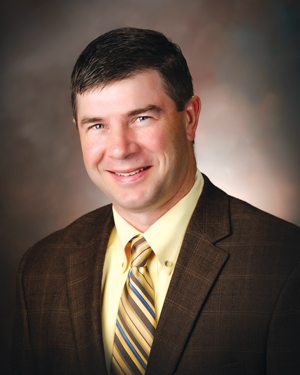A Closer Look: Bill Even
CEO, National Pork Board

Perhaps it was inevitable that Bill Even would return to the center of Midwestern agriculture — Iowa. He had been in and out of Iowa while farming in South Dakota, earning a law degree at Drake University, serving as South Dakota agriculture secretary, and working an increasingly high-profile progression of international and biotech jobs at DuPont Pioneer. He had lived on a farm near Sioux Falls, S.D., that his great grandparents had homesteaded in 1881 after moving from St. Donatus, Iowa. “Our connections to Iowa are legitimate,” Even said with a smile.
Along his agricultural path, Even bought the farm from family members. He and his brother started a farm equipment repair business, too.
The Clive-based National Pork Board, which operates on fees paid by hog producers, provides consumer information, supports research, and promotes pork. We asked Even about his path to one of the most prominent positions in the U.S. hog industry, which is centered in Iowa.
How did you decide to get a law degree at Drake University?
I bought the family farm when my uncle and father retired. I brought my brother in in 1997. We built a farm equipment repair business.
About that same time, I made the decision that as we were heading into the new millennium, I needed a stronger background in business and economics. At age 33, I started college at South Dakota State University in Brookings in ag business and econ. Monday, Wednesday and Friday I would commute up to campus, knock out the classes. I did online classes. I did night school in Sioux Falls. I did correspondent courses. I punched out my undergrad degree in two years.
We had a business law class and an ag law class while I was an undergrad. I loved them. On a bit of a lark, I signed up to take the LSAT. The test was on a Monday morning in Vermillion. Saturday afternoon I drive into Sioux Falls to Barnes and Noble thinking I should buy one of these LSAT study guides. I bought it and went home and looked at it, and I thought, ‘I should have been studying for this for three months.’ In a cold sweat I studied half of Saturday and all day Sunday and took the practice test and thought, ‘Wow, I am not prepared for this.’ I took the test. I got a way better score than I anticipated and got a full-ride scholarship to Drake.
You now live in Adel for the third time. How did that happen?
My family and I moved to Adel in 2002 when I started law school at Drake. I studied ag law there. I was working for DuPont Pioneer so I was back down here at corporate headquarters for a year in 2012. And now I’ve moved to Adel for a third time.
Our hometown in South Dakota had 500 people. We are small-town, rural people. When we looked around the Des Moines metro area as a family, there’s a lot of great communities in and around there. Adel is a county seat town with a lot of businesses. You don’t need to drive into Des Moines if you don’t have to. It’s small-town living. Safe. Clean.
How did you become South Dakota secretary of agriculture?
Right after law school I moved out to work for then-Gov. Mike Rounds as his energy policy adviser. This would have been in 2005. Oil prices were high. Wind energy had an initial build-out. Ethanol was just starting. I headed up the governor’s office of economic development. Then after 18 months in those two roles, the governor appointed me ag secretary. I was in that position for three years. Then I went to work for DuPont Pioneer. First I worked for the global relations team and ended up leading that team, working on biotechnology acceptance and international regulatory approvals and agricultural advocacy. A search firm contacted me about the job here. I started here June 6.
What makes you good for this job?
Association management requires a mix of skill sets. You really have to understand production agriculture. This place operates with the funds that producers put into the checkoff. We work for those 60,000 pork producers in the United States. We are their employees. You have to have dirt and grease under your fingernails. We raised cattle and hogs. We are a creature of federal statute. We have a lot of oversight through USDA. You need an understanding of law and policy and how government works. And the pork industry is a business. You have to have an understanding of the global scale. My career falls into three buckets: 20 years of active production agriculture, half a decade or so of being involved in managing a state government, and then six years at DuPont Pioneer in global relations and hitting sales targets.









